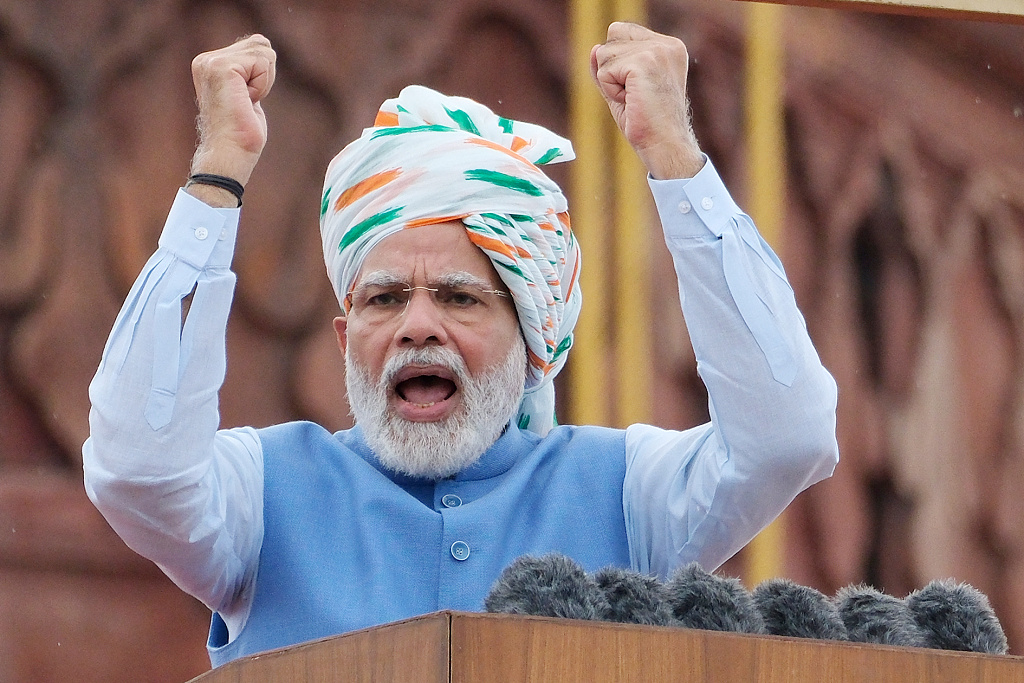US media: "75 years old" India, poverty is still the reality that millions of Indians face every day
Author:Global Times Time:2022.08.18
The US CNN article on August 15th, the original title: Modi promised to make India a developed country on Monday on the occasion of the 75th anniversary of the founding of the People's Republic of China. Let India a developed country. He said: "The way the world is looking at India is changing. We hope to become a developed country because the skills of 1.3 billion Indians. Diversity is our advantage." Published on the occasion of the anniversary.

On August 15th, the Indian Prime Minister Modi spoke at the 75th anniversary celebration of Indian Indian Independence in the Red Castle. Picture source: Visual China
Since independence, India has become one of the fastest -growing economies in the world. However, despite the surge in wealth in this country, poverty is still the reality that millions of Indians are facing every day. This region, language and beliefs are different, and they are still facing major challenges.
From 20 billion to 3 trillion
Independence India fell into chaos. After the bloody countries who had died of 500,000 to 2 million people and about 15 million people left their hometown, India once became synonymous with poverty. At that time, the average expectations of the Indians were only 37 years old, women were 36 years old, only 12%of Indians were literate, and GDP was $ 20 billion. 75 years later, India's economy was nearly $ 3 trillion and is the fifth largest economy in the world. The World Bank has raised India from a low -income level to a middle income level. Male literacy rates have increased to 74%, women are 65%, and the average life expectancy is 70 years.
This transformation is largely promoted by the "pioneering reform" of the 1990s. At that time, the debt crisis was severe and inflation was soaring. At that time, the prime minister Nalasinha Lao and the Minister of Finance Manmo Singh opened to foreign capital. Reform has promoted the investment of the United States, Japan and Southeast Asian companies in major cities, and Bandolore, a southern Indian city, has become the "Silicon Valley of India".
Power of wealth
Over the years after independence, India's international relations are defined by the non -alliance policy. This is the position favored by Nehru during the Cold War to avoid choosing a side station between the United States or the Soviet Union. This position is not welcomed by Washington, which hinders a closer relationship between the two countries. This cold lasted until 2000, when the US President Clinton visited India to promote reconciliation. Today, although India still pursues alliances in technology, Washington needs to balance China's rise, which has led it to the increasingly active security organization in the United States, Japan, and India and Australia to regard New Delhi as a key partner.
In addition to economic and geopolitics, India's growing wealth is helping to push its ambitions in various fields such as sports, culture and space. In 2017, India launched 104 satellites in a mission, breaking a world record. In 2019, India fired a anti -satellite missile and shot down a near -ground track satellite. Last year, India invested nearly $ 2 billion in space projects. In 2023, India is expected to launch the manned space task for the first time. India also uses its growing wealth to improve sports. In 2019, the country spent 297.7 million US dollars. Hollywood, India, a billions of dollars in the film industry, continues to attract fans from all over the world and quickly turn local actors into international superstars.
Poverty, climate and democracy
Although India succeeded, in the process of Modi seeking "breaking the vicious circle of poverty", the challenge still existed. In some measurement standards, India is still a "very poor" country, which is a "huge concern."
About 60%of the nearly 1.3 billion people in India in 2017 were less than $ 3.1 per day, and in this country with a narrow -minded country, women still face universal discrimination. India is also the front line of climate crisis. In April of this year, the average maximum temperature in some areas of India soared to a record level, and New Delhi exceeded 40 degrees Celsius for 7 consecutive weather.
As the heat on this land continues to rise, political pressure is getting greater. People are worried that under the leadership of Modi, India's secular structure and democracy are being eroded. Vencat at the Policy Research Center said that India has ensured its survival in the first 75 years, but in the next 75 years, it needs to deal with huge challenges and become a true global leader, not just the population. He said: "India may become the world's fastest -growing country in the next few years. Therefore, challenges are imminent and spread all over the world. The main thing is how to ensure the prosperity of India." Translated by Chen Xin)
- END -
Due to a serious shortage of labor, Main Airlines requires executives to be a three -month luggage porter

Polar News reporter MandaIntern Wei YingjieAccording to the BBC report on August 8...
US media: New York, USA, has more than 1,500 police officers this year will affect public safety
Overseas Network, June 13th. According to the New York Post reported on June 11, as of the end of May this year, more than 1,500 police officers from the New York City Police Department chose to resig